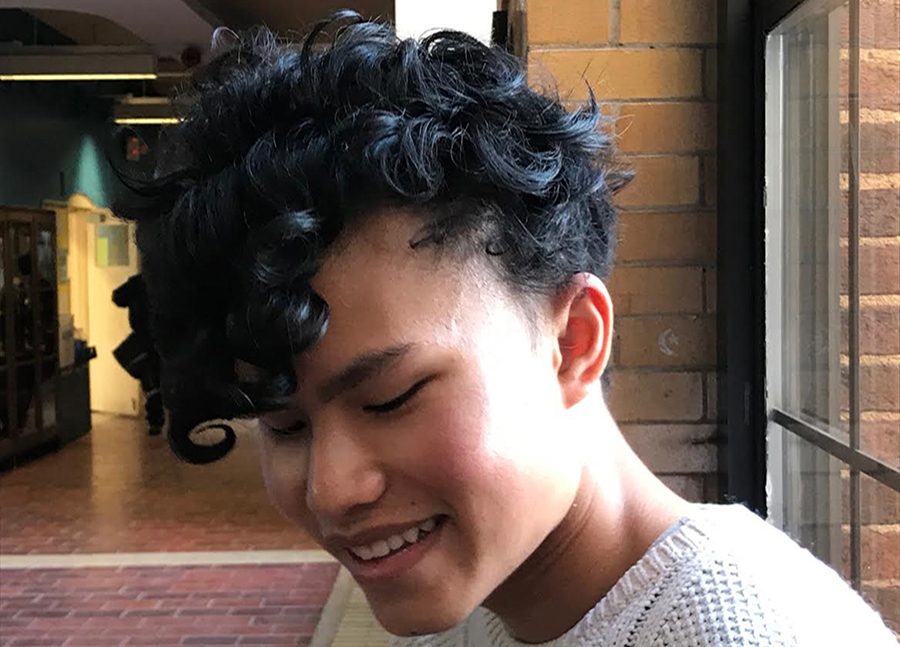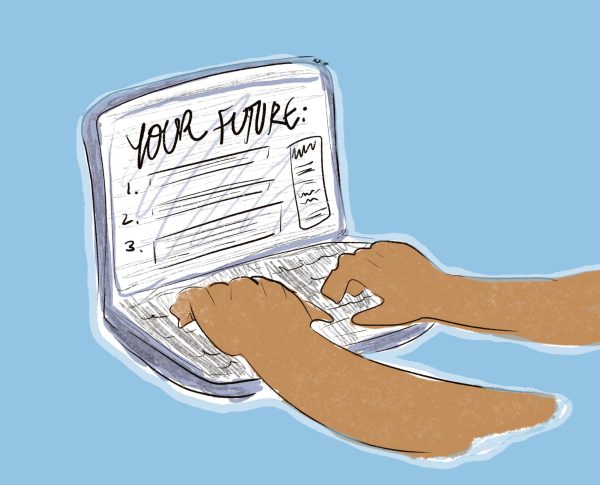Tuning out
Bao Polkowski sits on the second floor ledge. He talked about what he felt was the most important aspect of music to him, and how that affects the way he listens to it. “I mean, I know the actual musical aspect is really important, but I like to focus on the lyrical aspect,” Polkowski said. “I think lyrics are pretty important.”
Bao Polkowski, a junior at Community High School, had been stressed out. Like every other day, he just took out his phone, put his AirPods in, and escaped.
To Polkowski, music is more than just a beat and a melody.
“It serves not just for enjoyment, but kind of as like an escape for whatever is happening to you at the time,” Polkowski said. “Stuff can get hard and music makes it easy to just tune out the world, literally with a tune.”
That world of music has enabled Polkowski on numerous occasions to ignore the crappy parts of the day, or to embrace the good ones.
The vast variety of music available has also helped Polkowski in that respect.
“If I’m like jazzed then I’ll listen to music that’s a little more funky,” Polkowski said. “And if I’m sad i’ll break out the sad boy music like indie folk. I’ll cry to that, you know. Those are pretty much the only two basic emotions I feel on the daily. I’m either happy or I’m sad.”
According to a study conducted by the Harvard Medical School, listening to music is a common way of relieving stress among many demographics. It can help pregnant women, patients undergoing surgery, and the average working adult going through a busy day. But it’s especially prevalent among teens. That way of releasing emotions is one that, for Polkowski, is the most helpful.
“I’m not feeling great that day or if something happens to me almost always my instinctive reaction is to just listen to music, aside from crying,” Polkowski said.
Music has always been an important part of Polkowski’s life, but only fairly recently did he begin to really get into searching out new stuff.
“I think I seriously started to actively search out new music and listen to it seriously was probably my freshman year,” Polkowski said. “I don’t know, I think I just had a lot of time on my hands.”
One thing associated with the benefits of music for a teen is the friendships that come out of liking similar music—or vise versa—like Hip-hop, punk-rock, etc. But Polkowski feels that his taste in music isn’t really affected by his peers.
“I tend to not let what other people listen to affect me,” Polkowski said. “Because like, I’m not knocking Trap or Rap or Hip-hop, but it’s not really my type of music. Like I can understand that other people like it, and if they listen to it that’s fine.”
Favorite songs aren’t very constant for Polkowski. They can change with the mood. “It really depends on what I’m listening to at the time,” Polkowski said.
In terms of the downsides of listening to music, Polkowski believes there aren’t any, at least none that seriously affect him, and that if he needs to get something done, he’ll lay off the music.
“If it’s something that’s actually important, like if I need to study for a test, like for real, then I’ll stop listening to music and I’ll get serious for a second,” Polkowski said. “So I honestly don’t think that it messes with me all that much.”
In a study carried out by the University of Wales Institute in Cardiff, listening to music while studying can negatively affect how well one memorizes things, as well as one’s general attention towards their work.
Polkowski does believe that there are some disadvantages to music in general. “I mean think it can be used in ways that aren’t productive towards society,” Polkowski said. “Like I think some music is a waste of time.”
Despite his strong opinions and his daily exposure to music, Polkowski doesn’t feel that it provides any real sense of security. Instead it serves as a filler for the less exciting and interesting parts of the day.
“If I turn on music and I’m doing something else then it kind of becomes background music essentially, like I’m not really focusing on it,” Polkowski said. “I don’t really sit down and put my pods in and just go like “uhh, yeah”. It’s mostly just like something else to do. Like I don’t want to just wash the dishes alone in the quiet. I gotta turn on some Bob Marley, you know, and sing to the dishes.”
In the end, music really only serves one sole purpose for Polkowski. “It just serves as basically a distraction, you know, that’s really it.”









